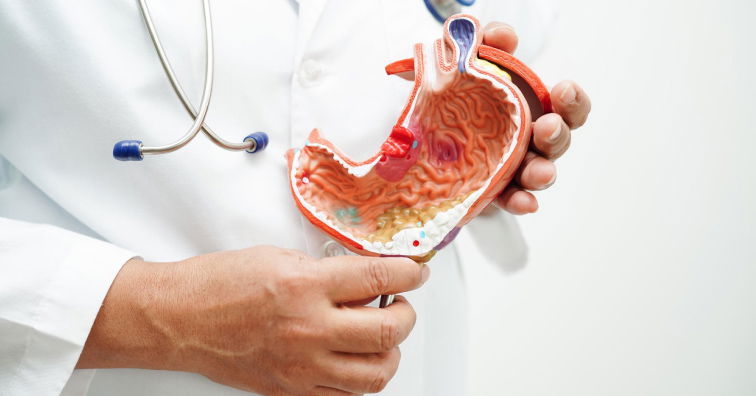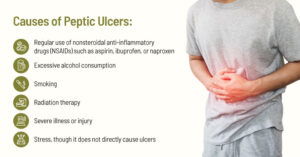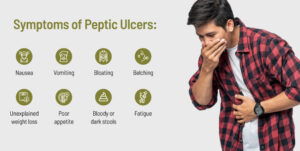
Related posts
Breast cancer awareness, warning signs and symptoms of breast cancer
Author

What is Peptic Ulcers?
Peptic ulcers are open sores that develop on the inner lining of the stomach, upper small intestine, or oesophagus. Untreated ulcers can cause many symptoms and complications. In this blog post, we will explore the causes, symptoms, and treatments for peptic ulcers.
Causes of Peptic Ulcers

The primary cause of peptic ulcers is the presence of a bacterium called Helicobacter pylori (H. pylori) in the stomach. This bacterium weakens the protective mucous lining of the stomach and duodenum, allowing acid to erode the inner lining and form ulcers. There are also other factors that can contribute to peptic ulcer development, such as:
- Regular use of nonsteroidal anti-inflammatory drugs (NSAIDs) such as aspirin, ibuprofen, or naproxen
- Excessive alcohol consumption
- Smoking
- Radiation therapy
- Severe illness or injury
- Stress, though it does not directly cause ulcers
Symptoms of Peptic Ulcers

The most common symptom of peptic ulcers is a burning pain in the stomach area. This pain can be felt anywhere from the navel up to the breastbone and may last from a few minutes to several hours. Other symptoms may include:
- Nausea
- Vomiting
- Bloating
- Belching
- Unexplained weight loss
- Poor appetite
- Bloody or dark stools
- Fatigue
It is important to note that some people with peptic ulcers may not experience any symptoms, especially in the early stages of the condition.
Treatments for Peptic Ulcers
Treatment for peptic ulcers aims to relieve symptoms, heal the ulcer, and prevent complications. The most common treatments include:
Medications
Doctors may prescribe medications to reduce stomach acid production, such as proton pump inhibitors (PPIs), H2-receptor antagonists, and antacids. Antibiotics may also be prescribed to eliminate H. pylori infection.
Lifestyle Changes
Making changes to your diet and lifestyle can help manage peptic ulcers. This may include avoiding spicy or acidic foods, quitting smoking, limiting alcohol consumption, and reducing stress.
Surgery
In rare cases where ulcers do not heal with medication, surgery may be necessary. Surgical options may include removing the ulcer, repairing the stomach lining, or tying off bleeding blood vessels.
Follow-Up Care
After treatment, it is important to follow up with your doctor regularly to monitor the healing of the ulcer and to prevent recurrence.
Conclusion
In conclusion, peptic ulcers are a common condition that can cause significant discomfort and complications if left untreated. By understanding the causes, symptoms, and treatments for peptic ulcers, you can take steps to manage the condition effectively and improve your quality of life. If you experience symptoms of peptic ulcers, it is important to seek medical attention promptly for an accurate diagnosis and appropriate treatment. For those in need of specialized care, Cytecare offers comprehensive Gastroenterology Treatment in Bangalore, ensuring you receive the highest standard of care.